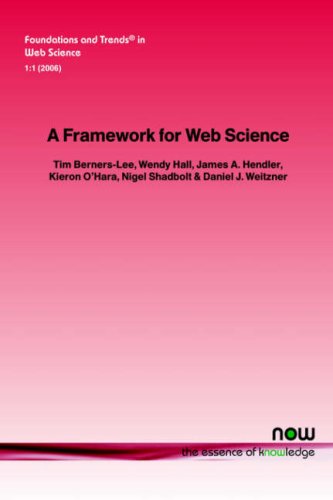The Web as a Liberal Artefact
A final point briefly worth making is that the Web is a space designed to let information flow, and to create opportunities for cooperation and collaboration. It is worth asking why freer information flow is a good thing, and the answers are pretty straightforward. It is good to have the freedom to express oneself in order that one can pursue one's own autonomous and authentic projects. Unhindered criticism of governments and other power centres tends to lead to better governance; information drives democracy. Both of these reasons have their roots in a liberal, individualistic view of the world, in the tradition of Locke, Mill and Rawls. Perhaps the Web is a liberal artefact?
There is certainly opposition to theWeb from many sources (most of these sources, it is fair to say, are more than happy to employ the Web as a tool for organisation, communication and dissemination). Many illiberal governments restrict their citizens' use of the Web, often using adaptations of firewall technology to create what is in effect a giant intranet within their borders. Even non-liberal democracies have something of a problem with the Web. For instance, the government of Singapore has a relatively light touch in its regulation of the Internet, but still blocks 100 or so pornographic sites, requires political and religious websites to be registered and licensed with the Singapore Broadcasting Authority, and bans election activity on the Web during election campaigns [197], even though it has a powerful vision of a knowledge-based economy and is one of the most enthusiastic governments in the world with respect to IT [273].
In the realm of non-governmental activity, the Web has also been seen as an agent of globalisation, and so views of the Web have been conditioned by authors' political views about that trend. Many see the Internet as a wonderful anarchistic paradise while the Web, with its slick websites and mass appeal, has destroyed all that and normalised the online world. Online is just as grim and unjust, for such writers, as offline [241]. Marketing has replaced democracy. In these discourses, neologisms such as 'cyberhegemony' and 'cyberdependency' abound [226].
For the Web to be a contributor to global well-being its developers have to pick their way through a number of tricky debates such as this; it is essential that theWeb does not become a global monoculture, while also avoiding the alternative of decomposing into several cultish miniwebs with little or no connectivity in between. The balance of respect for others' points of view and proper defence of one's own has always been a difficult one to strike in any sphere of human activity. At the moment, the Web surprises us with the fruitfulness of its connectivity. It is important that this is retained [30]. It may be that the fractal structure of the Web, if it can be nurtured, will be part of a solution [29]. We also need to understand the way that the Web is used in developing nations, rather than focusing on the Western democracies, in order to ensure that it can serve as wide a set of constituencies as possible [83].
Given all these worries, it is perhaps unsurprising that the US government has recently come under pressure about the prominence of its role in Web governance, despite the obvious success of the Internet and the Web so far. The United Nations Working Group on Internet Governance's 2005 report made a number of recommendations that all stakeholders should be involved in Internet governance [288]. This might change the liberalism of the Web. The likely effects of this on the Web itself are unknown (cf. [274]).
Notes:
With openess, egalitarianism of ideas, and free flow of information as its principles, the Web works as a liberal democracy, and totalitarian governments attempt to control or subvert it.
Folksonomies: politics net neutrality web science liberalism
Taxonomies:
/business and industrial/business operations/management/business process (0.513090)
/art and entertainment/visual art and design/design (0.497100)
/law, govt and politics/legal issues/human rights (0.494681)
Keywords:
Web (0.918353 (positive:0.192072)), liberal artefact (0.782484 (negative:-0.007967)), freer information flow (0.735117 (positive:0.830561)), final point briefly (0.723760 (positive:0.500670)), information drives democracy (0.708491 (neutral:0.000000)), bans election activity (0.693868 (neutral:0.000000)), relatively light touch (0.682188 (neutral:0.000000)), wonderful anarchistic paradise (0.681811 (positive:0.785034)), Singapore Broadcasting Authority (0.672027 (neutral:0.000000)), United Nations Working (0.654575 (positive:0.241439)), Web works (0.647342 (negative:-0.235135)), internet governance (0.644960 (positive:0.241439)), Web governance (0.618982 (negative:-0.435673)), liberal democracy (0.614079 (negative:-0.235135)), totalitarian governments (0.611426 (negative:-0.632598)), Web surprises (0.606414 (positive:0.712265)), better governance (0.591909 (neutral:0.000000)), illiberal governments (0.582942 (negative:-0.431380)), enthusiastic governments (0.580275 (positive:0.616112)), non-liberal democracies (0.580168 (negative:-0.417232)), free flow (0.578890 (positive:0.369992)), individualistic view (0.572706 (positive:0.416470)), Unhindered criticism (0.571979 (neutral:0.000000)), good thing (0.568792 (positive:0.830561)), authentic projects (0.565980 (positive:0.919536)), pornographic sites (0.563229 (negative:-0.442616)), Western democracies (0.560247 (neutral:0.000000)), power centres (0.559037 (neutral:0.000000)), global monoculture (0.558154 (neutral:0.000000)), religious websites (0.554815 (neutral:0.000000))
Entities:
theWeb:Company (0.798462 (neutral:0.000000)), Internet Governance:Company (0.707556 (positive:0.241439)), US:Country (0.561584 (neutral:0.000000)), Singapore Broadcasting Authority:Organization (0.522139 (neutral:0.000000)), United Nations Working Group:Organization (0.482313 (positive:0.241439)), Locke:Person (0.458039 (neutral:0.000000)), Rawls:Person (0.429729 (positive:0.235081))
Concepts:
Democracy (0.987276): dbpedia | freebase | opencyc
World Wide Web (0.825289): dbpedia | freebase | yago
Political philosophy (0.818177): dbpedia | freebase | opencyc
Internet (0.816116): dbpedia | freebase | opencyc
United Nations (0.808585): website | dbpedia | freebase | opencyc | yago
Liberal democracy (0.795848): dbpedia | freebase | yago
History of the Internet (0.730253): dbpedia
Website (0.723885): dbpedia | freebase | opencyc






